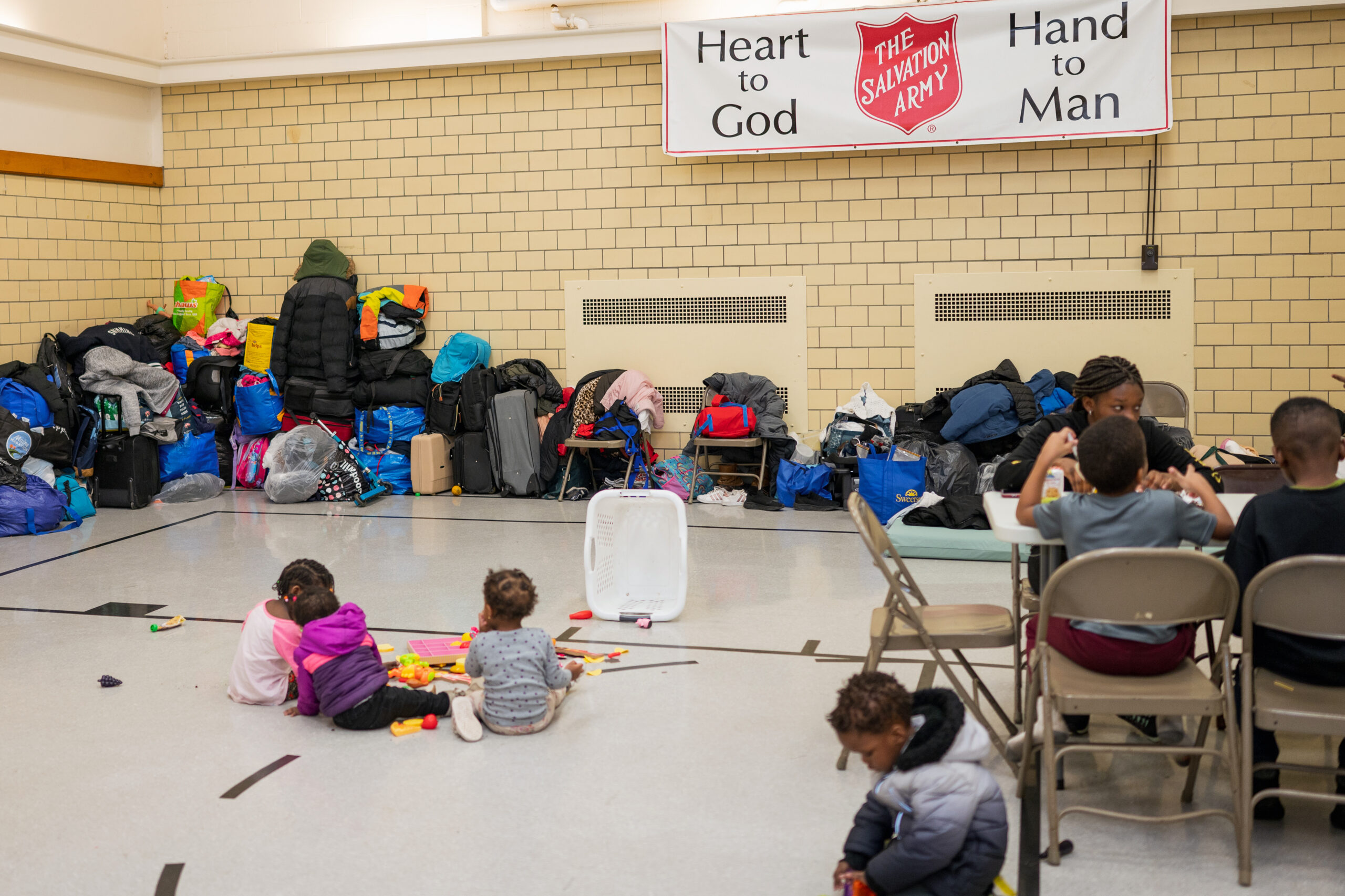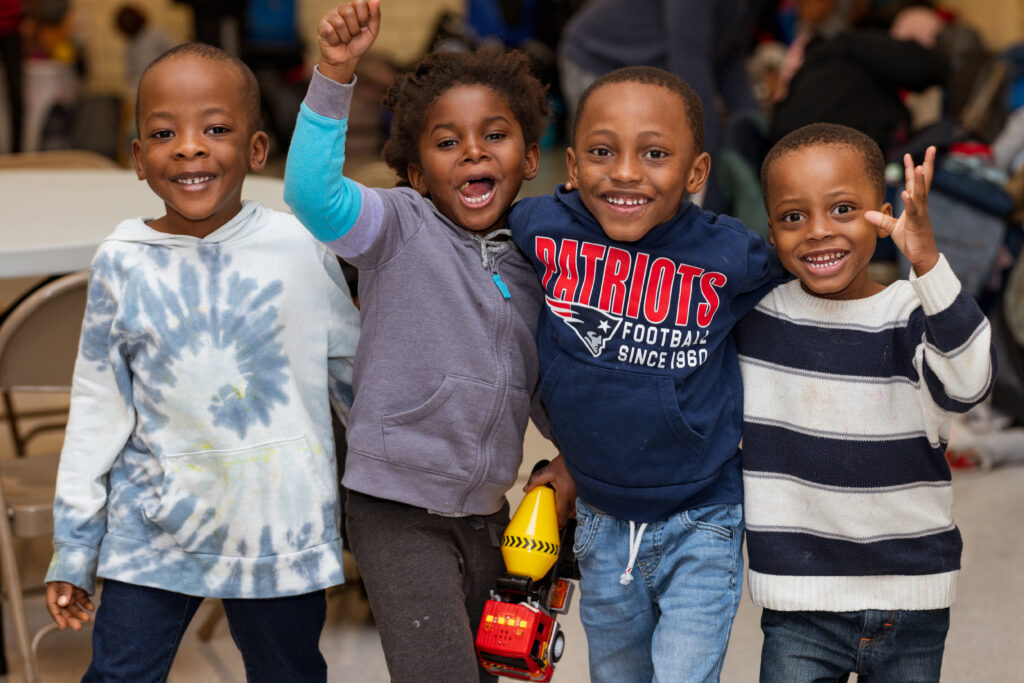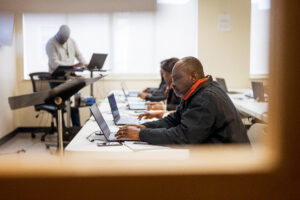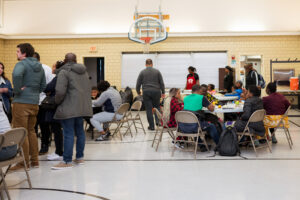Waking up on ‘Holy Grounds’
by Robert Mitchell

The children of asylum–seekers joyfully zip around on scooters and play games on the floor of this Salvation Army gym in Portland, Maine, as they wait for dinner. In a few hours, their parents will put down thin mattresses on that same floor and 77 people will sleep here.
Hundreds of asylees from various countries in Africa are showing up in Portland, but the housing market is tight and there are few prospects for work. The Salvation Army officers here make it clear to the press that they are not interested in discussing the “how” or “why” of the situation. They are simply focused on helping people through the love of Christ.
“The truth is, we have people in front of us who are cold, hungry, and have no place to sleep. So, we’re going to do what we have to do to care for them now because they’re here,” says Major Armida Harper, one of the officers in Portland.
The city’s shelters, ministries, and social services are full of migrants from Angola, the Democratic Republic of Congo, Rwanda, and Burundi. The Salvation Army is helping by providing many families with English as a Second Language (ESL), life skills, and computer classes so they can get jobs.
“We’re doing everything we can to help people ‘tool up’ so that when they are able to work, they will be successful,” says Captain Michael Harper. “They need to be able to speak English a little bit and have some basic computer skills.”
The migrants go to a local YMCA during the day but come to The Salvation Army for dinner and to sleep. The Salvation Army is working with the Maine Immigrants Rights Coalition to provide space for 77 people, many of whom get coffee in the morning from the Army’s “Holy Grounds” coffee ministry.
“People were just showing up here in the middle of the night from California and Texas,” Captain Mike explained. “They showed up wearing flip–flops, no coats, and nowhere to go. The city has been completely overwhelmed.”

Harrowing journeys
Few of the asylees speak English and those who do are guarded since they have family back home. They all have heartbreaking stories of escape and survival.
One example is Adam and Janelyton Segawa, and their son, Axam. The family left Uganda in October after being jailed and tortured for supporting the opposition National Unity Platform. Adam carries a newspaper clipping about his wanted status back home. His wife was operated on under mysterious circumstances and is still not sure what was done to her.
This Muslim family went to Central America and then Mexico before entering the United States through the southern border. Segawa said sleeping on a gym floor is “no problem” because at least everyone is safe and dry.
“We were struggling; sleeping on the streets with rain and everything,” Adam says. “I had to face many things while coming here with my family. I thank The Salvation Army for helping us in this situation. I am happy. I like it here. What I saw in Mexico, what I saw in Nicaragua and Guatemala, I think I am better off with my family.”
Adam said his goal is to be a truck driver in America and his wife is an experienced nurse.
Pedro Marin came to the United States with his wife and four children from Angola after running afoul of the government. He takes ESL classes at The Salvation Army in hopes of bettering his life.
“The Salvation Army has stepped up and provided us a place to sleep during this challenge and we appreciate that,” said Pedro, who is a Christian.
The family crossed the border in California and Pedro said he wasn’t quite sure where Portland was geographically, but he had grown fond of the area. “Our goal is to live here permanently and achieve a higher purpose,” he said.
Tough road ahead
Helio Mateus from the Angola Community of Maine, a non–profit that helps Angolans, provides information and guidance to the frightened migrants. As a Christian, he also tries to offer hope.
“My faith teaches that it is possible to overcome obstacles,” Mateus says. “When we face hardships, we just give it all over to God, seek His guidance, and hopefully in a short amount of time, things can get better along the way.”
Captain Mike said the asylees face an uphill battle.
“There’s no housing in Portland. It’s all used up,” he said. “It’s become a humanitarian crisis.
“The folks sleeping in our gym may be here six or nine months with young children in tow. It’s difficult. It’s hard to be a large family sleeping on a gym floor every night and there’s no prospect of housing or even the ability to work.”
Captain Mike said work permits are backed up and The Salvation Army and other advocacy groups are working with the federal government to loosen the requirements. Many of the migrants say they were told they would get a job, housing, medical care, and more in the U.S.
“They get here and there’s a gym floor,” he said. “They can’t work. There’s nothing to do during the day and they’re just shuffled from place to place. If the immigrant surge continues here in Portland, something is going to break. It’s just heartbreaking to see it.”
As rough as the life may be, Captain Mike said one of the migrants told him, “At least I don’t have people trying to kill me.” The children playing in the gym display a joy that belies their conditions.
Lieutenant Kim Clark, a former pre–school teacher before becoming a Salvation Army officer, often plays with the kids and lets them watch DVDs. “We allow them to have some joy and learn English,” she said. “They’re learning and they’re growing.”



Coffee is on!
Captain Mike said new advisory board member Lanre Fashina may soon start a weekly prayer meeting. Plans are also in place to start a brass band among the migrants.
In the morning, the migrants head to the front of the building to get coffee from the “Holy Grounds” window. The sidewalk is usually full of people when the window opens at 7 a.m. Captain Mike and others are often there to talk and pray with them.
Captain Mike says his church is right around the corner from an open drug market where people shoot up in broad daylight. Crack pipes and syringes are a common sight, so hope is needed more than ever.
“We’re at the epicenter for where all the vice, crime, and need is,” he said.
On a recent morning, the ministry gave out 442 cups of coffee. When the window first opened, the clientele was 75 percent local homeless people, but now it’s dominated by the migrants.
“That’s because the asylum seekers struggle with homelessness for many months after they get here,” Major Armida said. “They’re in the shelters and hotels so coming to us in the morning is their way to get a hot drink.”
Coffee ministry seems to follow the Harpers wherever they go.
In 2017 while stationed in Manchester, N.H., Captain Mike started a coffee ministry called “Mobile Joe’s.” He and other volunteers would walk the streets and parks, and hand out coffee to homeless people from backpack dispensers.

A ministry around java
When the Harpers arrived in Maine, they noticed that people who suffered from homelessness, drug and alcohol addiction, and various forms of mental illness gathered behind the church in the morning after leaving two city–run shelters. No one in the community served coffee to the people and that void gave Captain Mike an idea.
Thanks to a $13,000 grant from the Good Shepherd Food Bank as part of a food pantry overhaul, Captain Mike was able to install a fast food–style window at the church so he could serve coffee every weekday. The ministry, called “Holy Grounds,” began in July and is growing robustly.
“It seems like I’m always doing something with coffee,” Captain Mike says with a laugh.
“The people must leave the shelters every morning. It’s tough to get put out on the street without even a cup of coffee,” Captain Mike continued. “Other agencies do lunches, but no one was doing coffee. We saw a great opportunity.”
Captain Mike said “Holy Grounds” started slowly with just 10 or 20 people, but word quickly spread, and the ministry now averages more than 400 coffee drinkers a day.
“The real genius of this is that if we went out in the streets and tried to talk to more than 400 people, it would be really tough,” he says. “But every day, five days a week, we get to spend 30 to 50 seconds with about 400 individuals. They come, one by one, up to the window. We hand them the coffee and we can pray with them, talk to them about their soul, and connect them to other services.”
Captain Mike said he and the ministry’s volunteers pray with 15–20 people a day and ask, “What else can The Salvation Army do to help?”
“We refer a lot of people to our social services office. They need socks, clothing or other services,” he said. “It’s really giving us access to the most needy and vulnerable people and getting them other comprehensive forms of help.”
Hot coffee, warm hearts
Major Armida said the “very simple evangelism” of the coffee window goes a long way.
“We let them know we care enough about them to give them something to drink when they can’t get it anywhere else,” she said.
The coffee recipients are grateful for the morning boost of hot caffeine, Captain Mike said.
“They thank us. They thank God. It’s great,” he said.
In appreciation for the coffee, Rick Logan sometimes sweeps the sidewalk voluntarily. He lives in a tent behind a Trader Joe’s, a situation he says was “not bad” until someone stole his portable heater.
“I come here every morning,” he says. “I can’t miss it. This is awesome because a lot of guys like me can’t afford coffee in the morning. I enjoy my coffee, but I can’t really afford it all the time.”
Logan said Captain Mike gave him a Bible and he has been invited to church many times.
Pete Meserve lives in a nearby shelter, which offers no coffee before he must leave.
“They’re all wonderful people at The Salvation Army,” he said. “People usually aren’t that nice to us.”
A woman, who asked to remain anonymous, said the daily coffee is a godsend. She was in the shelter due to domestic violence.
“God bless these people for what they do,” she said. “Most people don’t even make eye contact with us. The people here treat me like I’m someone, you know? Like, I’m a person.”
Each morning, the “Holy Grounds” window is serviced by a few volunteers, including beneficiaries from the Adult Rehabilitation Center (ARC) in Portland.
Jean William’s friendly face is typically the first one people see. A former intake coordinator at the ARC, she arrives around 7:30 a.m., before the window opens, to help the Harpers get ready for the crowds.
Williams has a good rapport with the people and chats with them.
“I love it,” she said. “I really enjoy helping the refugee and immigrant population. I really like them, which I think is basic for anybody who serves.
“God has given me a heart for them. I feel it’s scriptural to be kind to people who are poor, immigrants, and homeless. It’s scriptural to give them a cup of water, kind of thing. I find them grateful and they’re polite to me. It satisfies me. It makes my heart happy.”
Friendly, listening ears
Chuck Liskey has been with the ministry since its humble beginnings, when it had just two Mr. Coffee machines. Today, he still enjoys talking and praying with people.
“When we started, they would hardly talk to us. Now I know the life stories of most of them who come up to the window,” Liskey said.
“They’re glad we’re here. We’re someone to talk to and they need to hear a friendly voice. They’re so used to hearing, ‘Get out of here.’ They don’t hear too many friendly voices.”
Liskey invites people to church, and some have started showing up on Sunday. He also urges others to check out the ARC program.
“If I can save one out of 10, then it makes it worth it,” he said.
Walter Kehoe, an ARC graduate and church employee, installed the window and now uses it to reach others.
“It’s part of my recovery foundation,” he said. “It keeps me clean and sober, and I’m trying to get the word out that ‘there’s help, if you want it.’
“The idea is to give them coffee, get them going, and encourage them to do something different with their lives than just sit around drinking and doing drugs. I tell them, ‘There is help if you want it. I’ve been down that road and you can change if you want to.’”
Envoy Stephen Taylor, the ARC’s administrator in Portland, said a few people reached through the “Holy Grounds” ministry have come to the ARC to inquire about the program.
“We’re seed–planting and we know that seed is going to turn into something beautiful,” he said. “We’re going to let the Lord do His work with the harvesting of it.”
God is in the preparation
Captain Mike said that about five people from the window attend church regularly.
The church relies on Google Translate to help people who speak French, Portuguese, and other languages. The Harpers have heard there are other African Salvationists in Portland and may invest in translation equipment if they start coming to worship.
“If we can get a translator, we want to open our corps to African Salvationists, so they feel they have a place here,” Captain Mike said. “Our corps will become whatever God needs it to be.”
Major Armida, who spent three years ministering in Africa for The Salvation Army before marrying Captain Mike, believes her experience there is helping now. The Harpers oversaw a homeless ministry in Cambridge, Mass., before starting “Mobile Joe’s” in Manchester.
“Each appointment has prepared us for the next one,” she said. “We’ve found that the secret to ministry is, you just work hard and love your people. When you work hard and love your people, which of course reflects your love of God, everything just falls into place. It sounds trite, but the truth of it is so powerful.”
Photography by Leah Carter

